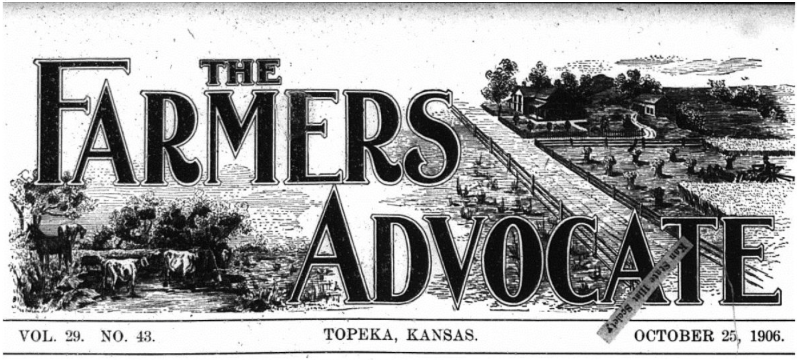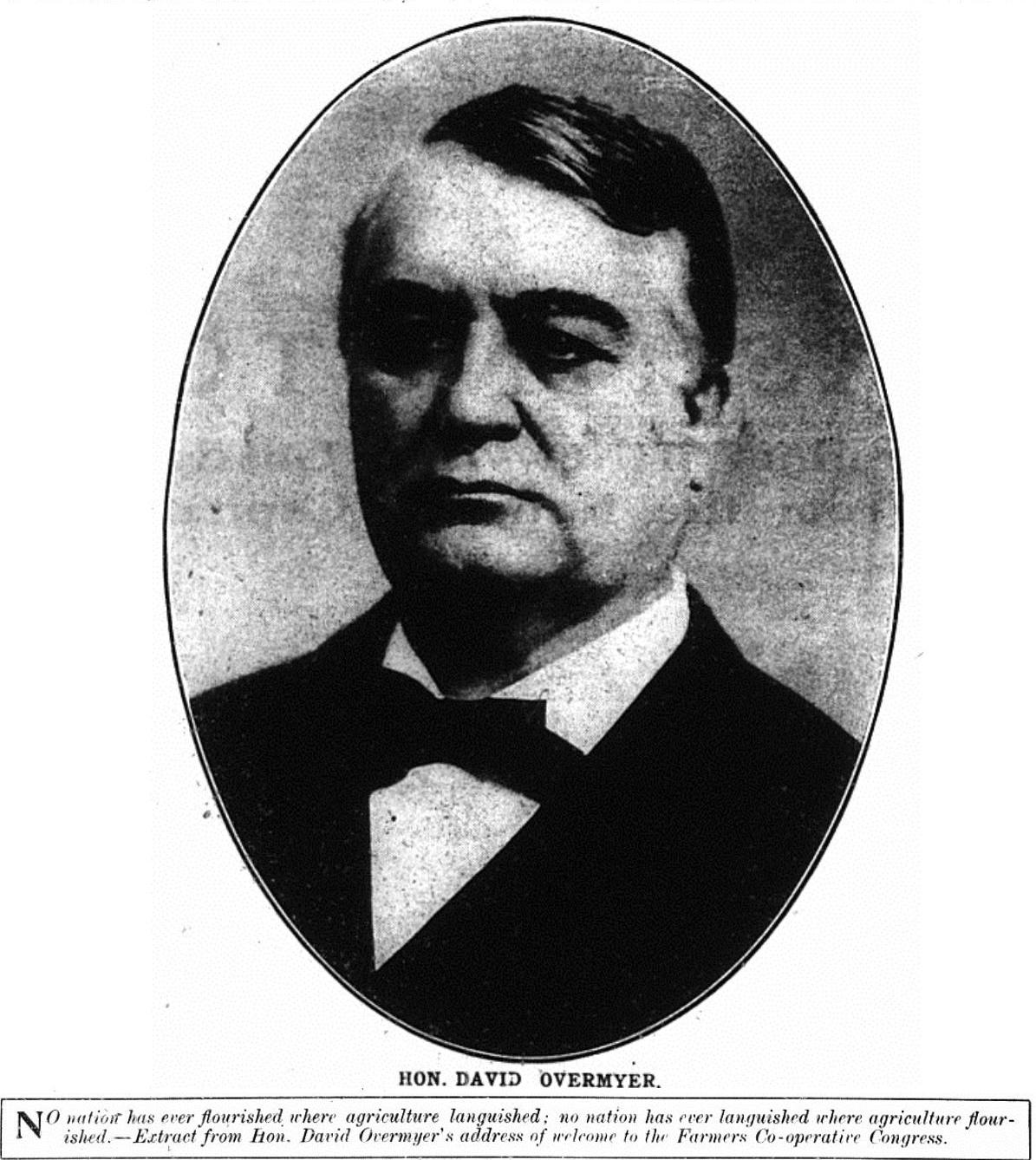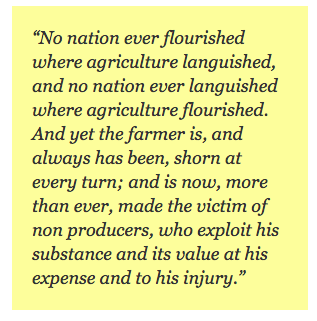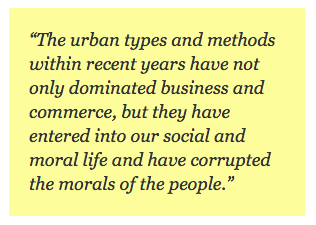

When Hon. David Overmyer died, the farmers of this country lost a friend — not a mere pretending friend for policy sake, but a loyal, true advocate of the cause of agriculture.
David Overmyer’s boyhood days were spent on a farm. There, early in life, he learned the value of toil and although he left the farm to become a lawyer, he cherished throughout his career, a close fraternal feeling for the farmer and whenever opportunity offered, his voice was raised on behalf of the producing classes.
Genius scorns conventionalities and David Overmyer had a way particularly his own about everything.
He was a genius, a master of the English language not even second to the brilliant Ingalls, a born orator and a poet in prose. There was a remarkable combination of rhythm, euphony, music and sound common sense in every utterance of this remarkable man — every utterance whether written or spoken. He unconsciously blended the poetic and the practical in a harmonizing manner.
The speeches and writings of David Overmyer are gems of literature and thought, but unfortunately, few verbatim copies of his speeches are in existence, for the reason that he always spoke extemporaneously, disdaining manuscript or even notes.
The Advocate, however, has in its files a complete copy of the address of welcome delivered by Mr. Overmyer before the Farmers Co-operative Congress which assembled in Topeka, October 22 of last year. From the Advocate of October 25, we reproduce Mr. Overmyer’s speech as follows:
“To the Farmers National Co-operative Business Congress, Mr. Chairman and Gentlemen of the Congress: On behalf of the people of this city I extend to you a most hearty welcome. You will find here an appreciative and sympathetic atmosphere. As my duty in welcoming you is purely a duty of courtesy, you will not expect from me any extended address. It may not be amiss, however, to call attention to a few points in which you may be interested. It is said that ‘self preservation is the first law of nature’. Also, that ‘the Lord helps those who help themselves’. And again it has been said, ‘Who would be free himself must strike the blow’. If I understand your mission, it is along such lines as I have suggested. You will find nobody in this world to help you, unless you are able to help yourself.
We are told in ancient fable that Anteus was invincible while his feet stood upon the sustaining earth. So nations and peoples are invincible so long as they live close to nature and cherish agriculture.

Light, heat, food, clothing, shelter. These are the essentials of civilized life. And yet, the farmer cannot purchase an article which enters into any of these in a free and open market; but is compelled to purchase them all, except such as he himself may produce, in a market which is completely monopolized and in which prices are determined, not by the laws of trade, but by the arbitrary will of a limited number of men. And, on the other hand, he is confronted by a combination of purchasers, and is prevented from access to a free and open market in which to sell his products by combinations, who, having driven out all competitors, are the only purchasers to whom we may offer his products.
We are told that prices are determined by the law of supply and demand, and that is true. But allow me to control the supply, or to control the demand, and I will control the price. Both supply and demand are controlled, at present, by the combinations to which I have referred, which shear the farmer of his profits and put up the price enormously to all consumers. They corner and control the supply or finished products which are to be placed on the general market for the general public, and thereby control the price arbitrarily. They limit the number of purchasers and combine the limited number, and thus they limit the demand for the farmers’ products by limiting the number of purchasers, and by a rigid combination of the limited number. Both producers and consumers suffer from the actions of these trusts and combinations which rule the markets. The farmer is a constant and great sufferer at their hands.
Again the transportation companies contribute greatly to the wrongs under which the farmers suffer by excessive rates and discrimination’s and rebates. The conduct of the companies in this respect in this state has been and is most flagrant and it is the same elsewhere, unless, perhaps, in Texas, which state has attained to a greater control over the railroads than any other state.
Wheat shipped from central Kansas to Kansas City bears a rate of 15 cents a hundred; while from Kansas City to Galveston the rate is 15 cents a hundred. But if the shipper would send his wheat from central Kansas directly to Galveston he must pay the rate from Kansas City plus the rate from his shipping point to Kansas City, even though he is as near Galveston as Kansas City it. Thus, he must pay double the rate to Galveston which a shipper shipping the same distance must pay who ships from Kansas City; and even if he should ship from Caldwell to Galveston, that point being 200 miles nearer Galveston than Kansas City, his rate will be 30 cents, while the rate from Kansas City to Galveston will be 15 cents.
Apples are shipped from Buffalo, N.Y. to the Pacific coast. Apples are also shipped from Kansas to the Pacific coast. The shipper from Kansas must pay as high a rate for half the distance to the Pacific coast as the shipper from Buffalo pays for the entire distance across the continent. Citrous fruits are shipped from the Pacific coast to Boston and New York. They are also shipped to Kansas. The charge for shipping from the Pacific coast to Kansas is the same as the charge for shipping from the Pacific coast to Boston and New York. Lumber is shipped from the western camps to Agra, Kan., 57 cents. It is carried on 200 miles further to Kansas City for 50 cents. Lumber is shipped from the southern lumber camps to Agra for 30 cents and carried on to Denver, several hundred miles further, for 30 cents; while on the shipments within the state the rates are excessive and great discrimination’s abound. These are but a few examples.
These high-handed practices of transportation companies are a great burden on all producers, and especially upon farmers. These wrongs have been going on for years, and though we have made some laws, and the courts have given a few wholesome opinions, yet very little, if any, impression has been made upon the general evil, and it is certainly true that conditions in these respects are as bad as they ever were.
The question which confronts the farmer is, How shall these evils be remedied? It will never be done by anybody for you, and there will be no improvement of your conditions until you organize to take care of yourselves. Once, nearly all of the people lived in the open country. Now, one-half of them live in cities and towns. Once, the impulse that ruled the government was rural. Now, it’s urban. Once the idea of public men are sentimental. Now, they are commercial and called ‘practical’. Once the question was, is a thing right? Now the question is, will it pay?
These changed conditions make it necessary as never before, that the farmers of the country shall organize, as never before, and as one man, demand their rights. When this is done, and not until this is done, will the farmers resume that importance and that dignity that were once theirs. They will not only enjoy the benefits that are due them as the producers of all that sustains life, but the methods, notions and habits of all the people will be changed.

The restoration of the farmers to their proper place will greatly improve the morals of the country by causing a return to the permanent, stable and abiding manners, customs and morals which under urban influences have greatly deteriorated.
And now, gentlemen, wishing you every success in your most laudable work, I again extend you a most hearty welcome.”
David Overmyer was one of the really great lawyers of the west. Moreover, he was a power among men. He might easily have amassed a great fortune. But he didn’t. He was content to be simply prosperous and provident. Summed up tersely, he fought the people’s battles strictly as a matter of principle — and he did it to his own financial detriment.
An untarnished name will be written in history as the monument to David Overmyer’s illustrious and exemplary career.
—courtesy of Tom Giessel












